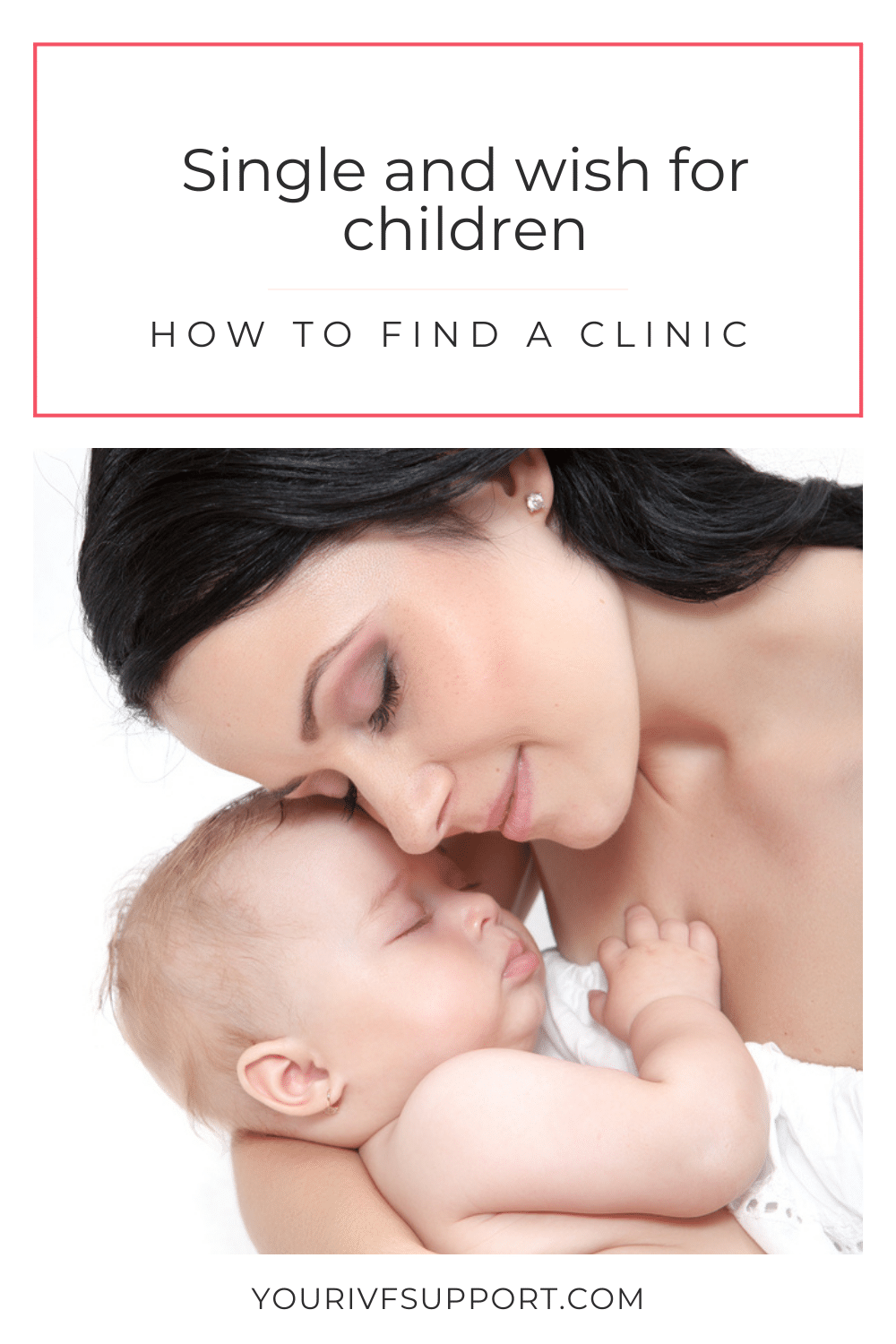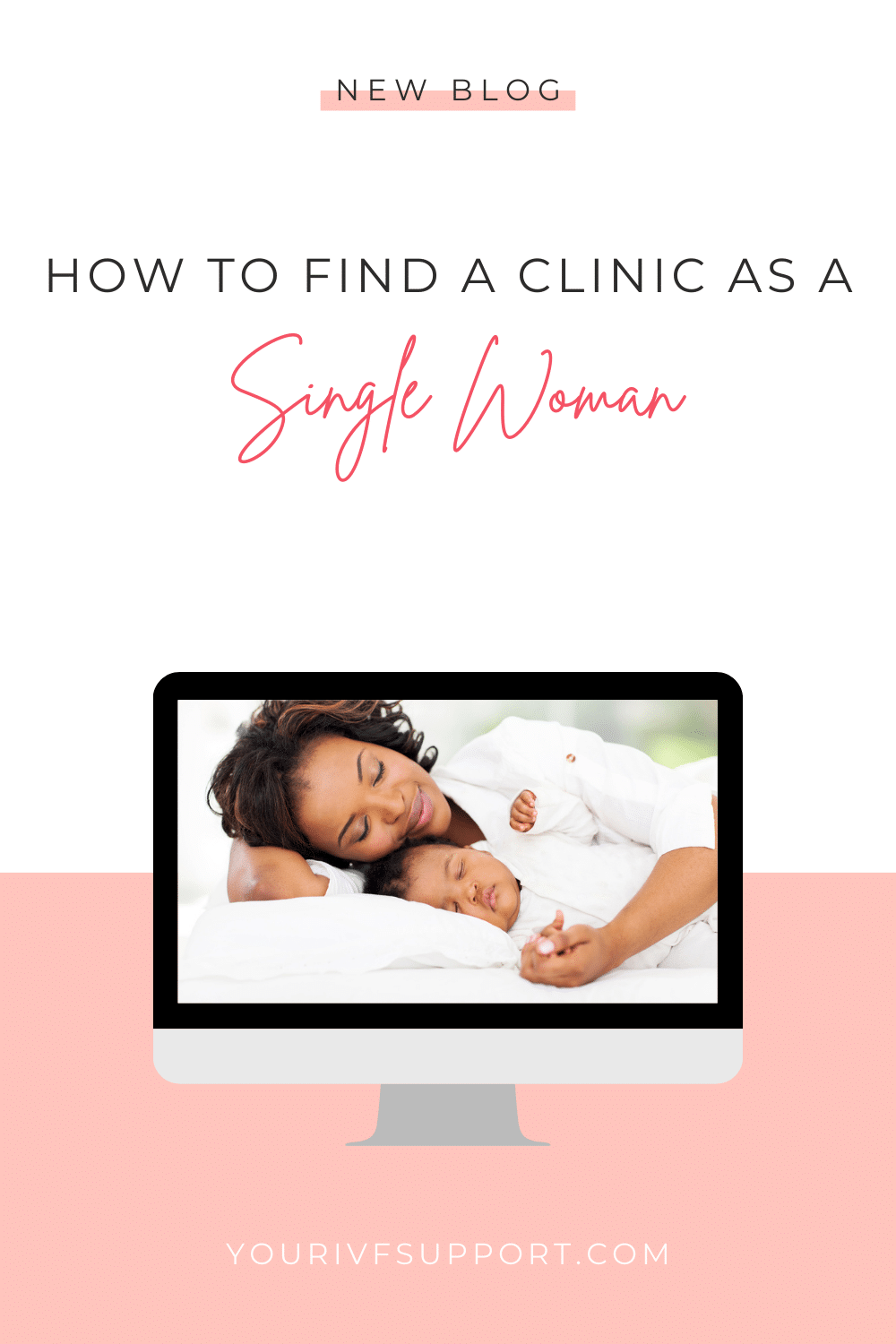Having children is an important life goal for many women. But for single women who want to have children, achieving this dream can be a challenge. Fortunately, there are now many fertility clinics abroad that specialise in the needs of single women.
But how do you find the perfect fertility clinic for single women abroad?
In this blog post, we look at the different factors to consider when looking for the ideal fertility clinic for single women. From legal considerations, to cultural and climatic aspects, to treatment options and procedures, we will discuss all the relevant points to help you make an informed decision and get closer to your dream baby.
Explanation of the reasons why many single women choose a fertility clinic abroad.
Today, more and more single women want to start a family. But without a partner, it can be difficult to make this dream come true. Many of them turn to fertility clinics abroad to fulfil their desire to have a child. But why are so many single women seeking fertility treatment abroad?
Legal barriers at home
Some countries have strict laws that restrict or even prohibit single women's access to artificial insemination. These women are often forced to travel abroad to find a suitable clinic that meets their needs.
Multiple treatment options
Fertility clinics abroad often offer a range of treatment options that may not be available or legal in other countries. For example, some countries allow open and anonymous donation of sperm, eggs or embryos, which may be an option for single women.
Anonymity
Another reason why single women choose fertility clinics abroad is anonymity. Many women do not want their families, friends or employers to know that they are undergoing IVF treatment. By choosing a clinic abroad, they can maintain their anonymity.
Cost efficiency
The cost of artificial insemination can be very high, especially for single women who may have to pay for the treatment alone. However, many fertility clinics abroad offer affordable treatment options, which is an important factor for many women.
Expertise and success rates Another reason why single women look for fertility clinics abroad is the expertise and success rates of these clinics. Many clinics abroad have highly experienced medical staff and state-of-the-art facilities, which can lead to higher success rates.
There are many reasons why single women choose to use fertility clinics abroad. Choosing a fertility clinic abroad can be a difficult decision, but finding the right one can help you achieve your dream of having a family.
Things to consider when looking for a fertility clinic abroad
When single women are looking for a fertility clinic abroad, there are many considerations to take into account before choosing a clinic. It is important to find a clinic that is not only legal and safe, but also meets the needs of the patient. In this blog post, we will discuss the key considerations when looking for a fertility clinic abroad. These include legal considerations such as laws and regulations, cultural and climatic considerations, cost considerations and the clinic's reputation and experience. We will also look at the specific treatment options and procedures available in different countries to ensure that patients receive the best possible care. Finding the right fertility clinic can be challenging, but when all considerations are taken into account, it can help make a family's dream come true.
Legal considerations
When single women are looking for a fertility clinic abroad, legal considerations are an important factor in choosing the right clinic. The laws and regulations surrounding artificial insemination vary greatly from country to country, and it is important to be aware of these before choosing a clinic.
Some countries have strict laws and restrictions on artificial insemination, especially for single women. In some cases, artificial insemination is banned for single women or only allowed for heterosexual couples. In other countries, there may be certain restrictions or regulations on the type of treatment that can be carried out.
It is important to find out about the laws and regulations in the country where you are looking for a fertility clinic. For example, some countries allow open and anonymous donation of sperm, eggs or embryos, while others prohibit or strictly regulate this. It is also important to check whether treatment abroad is legally recognised in your home country and whether the doctor or clinic providing the treatment meets the required standards.
It is advisable to contact a reputable fertility clinic with a valid licence and appropriate experience. Such a clinic can advise patients on legal requirements and restrictions, and help them obtain the necessary documents and records to ensure successful treatment.
Legal considerations are an important factor when looking for a fertility clinic abroad. It is important to carefully research the laws and regulations of the country to ensure that treatment is safe and legal. A reputable clinic can help navigate these legal considerations and enable patients to have a successful IVF treatment.
Cultural considerations
When looking for a fertility clinic abroad, it is important to take cultural considerations into account. Cultural differences between countries can have a significant impact on how IVF is performed and how patients are treated. It is important to understand and take into account these cultural differences to ensure that patients receive appropriate and respectful treatment.
An important cultural factor when looking for a fertility clinic abroad is language. It is important to ensure that patients understand and speak the language of the country in which the clinic is located to ensure effective communication with medical staff and others involved.
Another important cultural factor is the cultural attitude towards assisted reproduction. In some countries, artificial insemination is considered a taboo subject, while in others it is accepted and encouraged. It is important to consider how society in the country where the clinic is located reacts to artificial insemination and how patients are treated in that society.
It is also important to consider the religious and ethical beliefs of the country in which the clinic is located. In some countries, religious beliefs may prohibit certain treatments or procedures.
Climatic considerations are also important. Patients should find out what the climate is like in the country at the time of treatment and how it may affect their health and well-being.
Cultural considerations are an important factor when choosing a fertility clinic abroad. It is important to understand the cultural differences between different countries and societies to ensure that patients receive appropriate and respectful treatment and that their insemination is successful.
Cost efficiency
For single women trying to have children, artificial insemination can be expensive, especially if they have to pay for it themselves. Cost-effectiveness is therefore an important factor in choosing the right fertility clinic abroad. There are several factors to consider to ensure that the treatment is affordable and of high quality.
One important factor is the total cost of treatment, including medical and non-medical costs such as medication, accommodation, transport and food. It is advisable to compare costs in different countries and clinics to find the most affordable option.
It is also important to consider your treatment options. Some treatments may be more expensive than others, but they may also have higher success rates. It is therefore advisable to compare the success rates and costs of different treatment options to choose the most effective and cost-effective option.
It is also important to consider the availability of insurance or financing options. Some fertility clinics offer financing plans to help patients share or fund the cost of treatment. It is advisable to find out about these options and, if necessary, choose a clinic that offers suitable financing options.
You should also consider any tax benefits available in the country where the clinic is located. In some countries, medical expenses may be tax deductible, which can reduce the cost of treatment.
Cost-effectiveness is an important factor in choosing the right fertility clinic abroad. It is important to consider the total cost of treatment and the availability of insurance or funding options, and to compare treatment options and success rates to choose the most effective and cost-effective option. Careful consideration of costs can help ensure that patients are able to have a successful insemination procedure without putting undue strain on their finances.Cost-effectivenessWhen single women are looking for a fertility clinic abroad, there are many considerations to take into account before choosing a clinic. It is important to find a clinic that is not only legal and safe, but also meets the needs of the patient. In this blog post, we will discuss the key considerations when looking for a fertility clinic abroad. These include legal considerations such as laws and regulations, cultural and climatic considerations, cost considerations and the clinic's reputation and experience. We will also look at the specific treatment options and procedures available in different countries to ensure that patients receive the best possible care. Finding the right fertility clinic can be challenging, but when all considerations are taken into account, it can help make a family's dream come true.
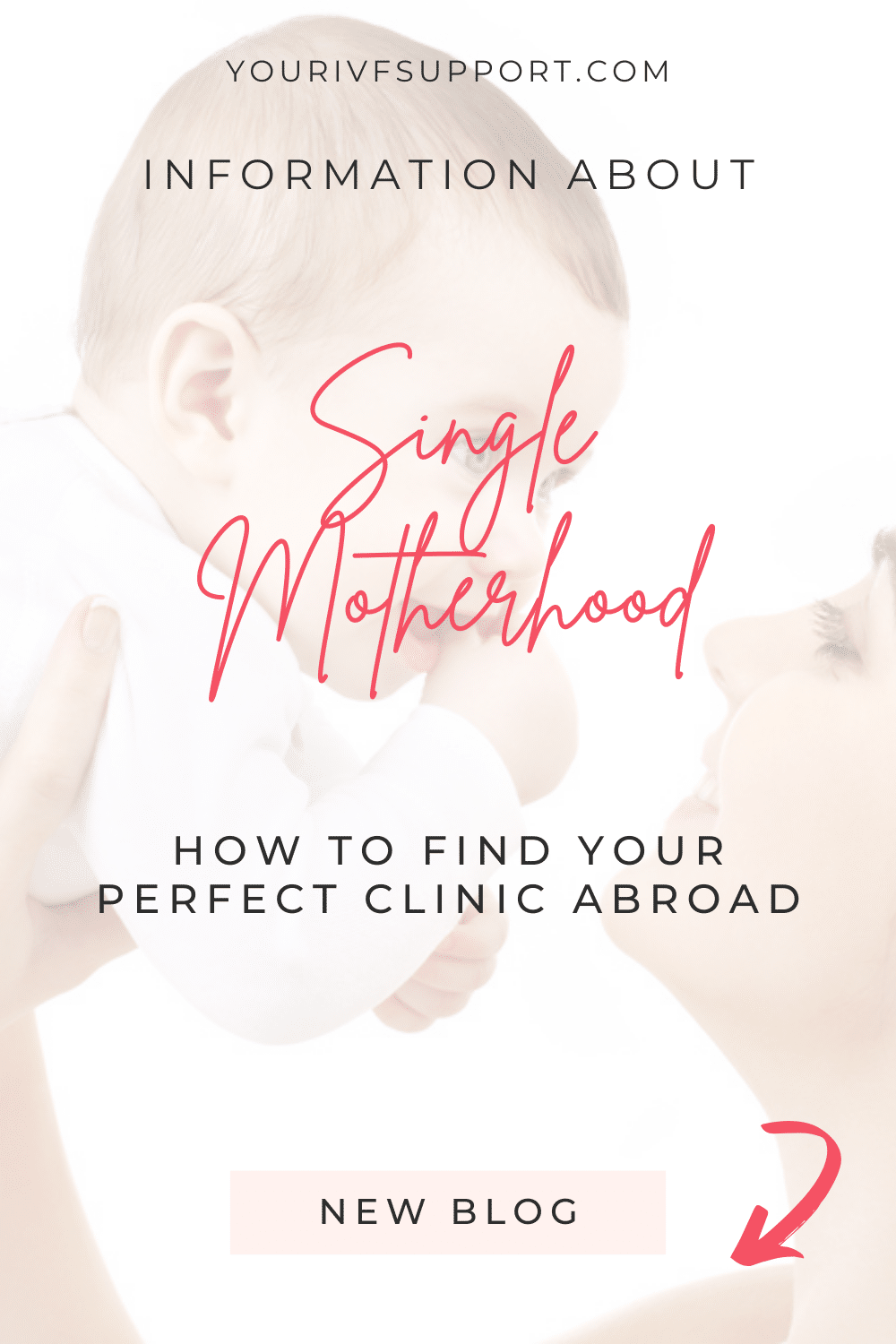
Legal basis for single women who want to have children
The legal framework for single women wishing to have children varies from country to country and can be an important factor in finding a suitable fertility clinic abroad. For single women considering artificial insemination, it is important to find out about the legal framework in the country where you are considering treatment.
In some countries, artificial insemination is not available to single women or is only available to heterosexual couples. In other countries, there are restrictions or regulations on the type of treatment that can be carried out, such as the type of donation or the number of embryos that can be created in a cycle.
It is therefore important to find out about the legal framework in the country where you are looking for a fertility clinic. Careful consideration of these legal considerations can help ensure that patients can have a successful IVF procedure that is in accordance with the applicable laws and regulations.
With this in mind, it is advisable to use a reputable clinic with a valid licence and appropriate experience to ensure that the treatment meets the legal requirements. Such a clinic can also help patients navigate the legal framework and obtain the necessary documents and records for successful treatment.
Overview of the different laws and regulations in different countries regarding artificial insemination for single women
Artificial insemination is a popular way for single women to fulfil their desire to have children. However, the laws and regulations regarding artificial insemination for single women vary from country to country and can make it difficult to find the right fertility clinic abroad. In this article, we provide an overview of the different laws and regulations in different countries regarding IVF for single women.
Singles will NOT be able to receive a sperm donation in the following European countries (as of April 2023)
Albania, Austria, Bosnia and Herzegovina, Czech Republic, Croatia, Lithuania, Norway, Poland, Slovakia, Slovenia, Spain, Switzerland and Turkey.
In the following countries in Europe, singles can PARTICULARLY receive open sperm donation (as of April 2023)
Armenia, Bulgaria (anonymous only), Germany (open donation), Iceland, Kazakhstan, Croatia, Moldova, Montenegro, Serbia and Belarus.
Countries where open sperm donation is permitted for singles
Denmark, Finland, France, Greece, United Kingdom, Ireland, Malta, Netherlands, Portugal, Republic of Northern Cyprus (delivered from Denmark), Russia, Sweden.
Countries where single people are allowed to receive anonymous donations
Belgium, Denmark, Estonia, France, Greece, Hungary, Latvia, Republic of Northern Cyprus, Republic of Cyprus, Romania, Russia, Spain, Ukraine.
Explanation of treatment options such as sperm donation, egg donation or double donation and insemination.
More and more single women are deciding to have a child and master their lives as single mothers. Various treatment options are available to them, such as sperm donation, double donation and insemination.
Insemination is a comparatively simple method of artificial insemination and can be performed in different settings. The sperm used can be either fresh or frozen. Success rates depend on various factors, such as the age of the woman, the quality of the sperm used and the timing of the insemination in the cycle. Overall, success rates are around 10-20% per cycle.
The combination of sperm donation and IVF treatment (in vitro fertilisation) is a common method for single women who want to become pregnant. Here, the sperm of a donor is processed in a fertility clinic and introduced into the woman's egg. Fertilisation thus takes place outside the body. Compared to insemination, this method has higher success rates, which can be around 30-40% per cycle. However, the process is more complex and involves higher costs.
Double donation, which involves both sperm and egg donation, is an option for women who cannot produce their own eggs due to infertility or genetic diseases. Success rates are comparatively high because both the sperm and the egg come from donors with high fertility. However, this method often involves higher costs and moral and ethical issues can be raised as the child has no genetic link to the mother.
It is important to note that each of these treatment methods can be associated with risks and possible complications. It is therefore advisable to seek advice from a qualified doctor and have a full medical examination to ensure that the treatment is safe and effective.
The various treatment options such as sperm donation, double donation and insemination for single women who wish to have a child are a way to fulfil their dream of having a child. However, it is important to be well informed and seek qualified medical advice in order to make the best possible decision for themselves and their future child.
Advantages and disadvantages of open and anonymous donations
Deciding between open and anonymous donation can be a difficult choice for single women who want to have children. Here are some advantages and disadvantages of both options:
Open Donation
With an open donation, the child has the opportunity to meet the donor later if they wish. Here are some of the advantages and disadvantages:
Advantages
- The child has the opportunity to meet their biological father.
- The child has the opportunity to learn more about their genetic parentage.
- The possibility of developing a relationship with the donor and having an additional family member.
Disadvantages
- The child may be emotionally distressed if the donor is not interested in a relationship or cannot be found.
- The donor may later change their mind and refuse contact.
- There may be legal uncertainty about the donor's role in the child's life.
Anonymous donation
In an anonymous donation, the donor remains unknown and the child has no opportunity to meet the donor. Here are some of the advantages and disadvantages:
Advantages
- The child is not emotionally burdened by wanting to meet the donor if the donor cannot be found or is not interested.
- There is a clear legal situation regarding the donor's role in the child's life.
- The donor's privacy is respected.
Disadvantages
- The child has no way of knowing his/her genetic parentage.
- The child may be emotionally distressed if he or she cannot fully identify with his or her identity.
- There is no opportunity to develop a relationship with the donor.
It is important that single women who wish to have children weigh up the pros and cons of both options and make a decision that is best for them and their future child. It is also advisable to seek advice from a qualified doctor or counsellor in order to make an informed decision.
Advantages and disadvantages of making a known donation
A known donor is someone the single woman knows personally and who is willing to act as a sperm donor. Here are some of the advantages and disadvantages of this option:
Advantages
- The donor is a known person, which can bring a higher level of security and trust to the donation.
- There is an opportunity to build a relationship with the donor and trust them in other areas of your life.
- It is easier to obtain information about the donor and possibly genetic information from the family.
Disadvantages
- Managing the donor's legal status can be complicated and potentially conflictual.
- It may have a negative impact on the relationship with the donor as the child grows older.
- It may be difficult to manage the donor's privacy and role in the child's family.
It is important to remember that known donors are not automatically considered ideal. It is also important to carefully consider the pros and cons before making a decision. It is also advisable for known donors to undergo a medical examination to ensure that the sperm is of high quality and free from infection or disease.
It is also important that all parties sign a written agreement on the details of the donation and its conditions, to clarify the legal situation and avoid any potential conflicts in the future. Overall, the decision to use a known donor is a very personal one, based on the individual circumstances and preferences of the people involved.
Denmark, Finland, France, Greece, United Kingdom, Ireland, Malta, Netherlands, Portugal, Republic of Northern Cyprus (supplied from Denmark), Russia, Sweden.Countries where anonymous donation is permitted for singles
Belgium, Denmark, Estonia, France, Greece, Hungary, Latvia, Republic of Northern Cyprus, Republic of Cyprus, Romania, Russia, Spain, Ukraine.
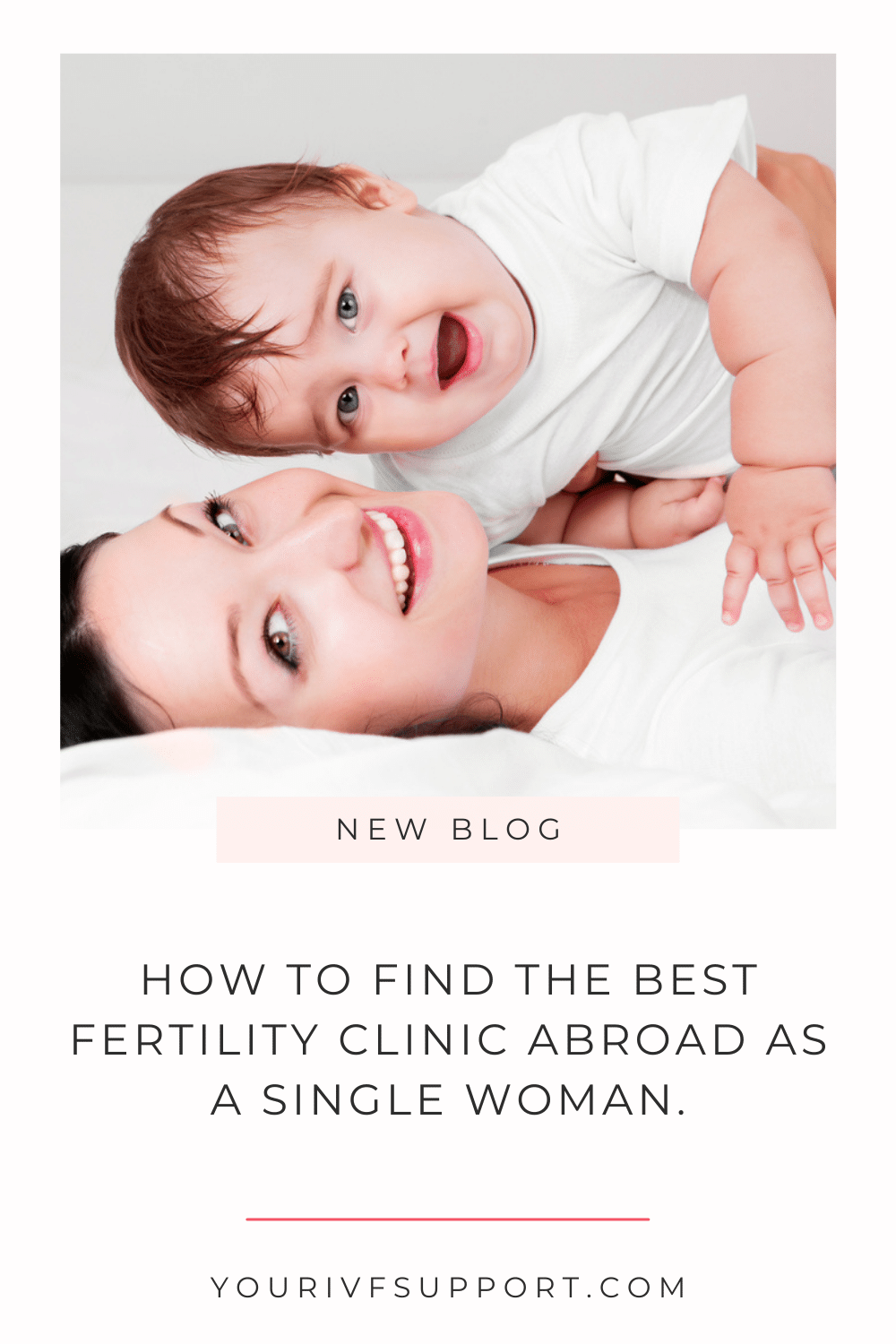
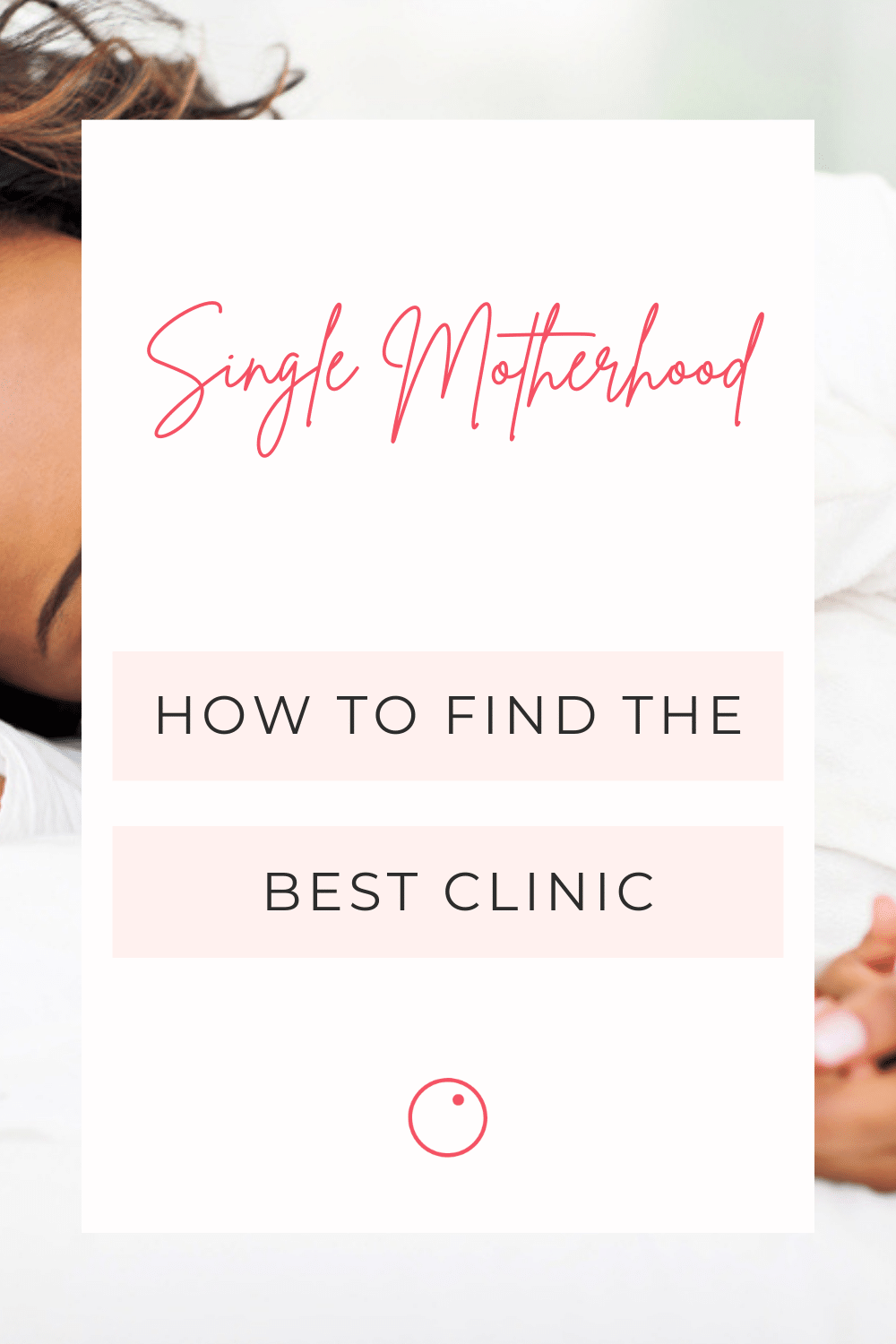
Most popular countries with fertility clinics for single women
More and more single women are choosing to go to a fertility clinic abroad to fulfil their dream of having a child. Some of the most popular countries for single women wishing to have children are Spain, Denmark, Northern Cyprus and Greece. These countries have a large number of reputable fertility clinics that specialise in the needs of single women and offer high quality medical treatments. In this article we will take a closer look at each country and the services they offer.
Spain
Spain is a popular destination for single women seeking fertility treatment abroad. Spain has a large number of fertility clinics that specialise in the needs of single women and offer the latest technology and treatment methods. Treatment costs are often lower than in other European countries and success rates average around 60-70%.
Anonymous donation is allowed in Spain, but donors must meet certain requirements, including a medical examination and genetic analysis.
Denmark
In Denmark, genetic testing of embryos is prohibited by law. This means that women who undergo IVF treatment in Denmark often have failed pregnancies or a higher rate of miscarriages due to genetic abnormalities. For this reason, success rates for older women in Denmark are often much lower than in other countries, such as Spain, Greece and Northern Cyprus, where genetic testing of embryos is allowed.
In Denmark, open donation is allowed, which means that the child has the opportunity to meet the donor later. Anonymous donation is also possible, but donors must meet certain requirements, such as a medical examination and genetic testing.
Northern Cyprus
Northern Cyprus is an emerging destination for single women seeking fertility treatment. There are a number of clinics here that specialise in the needs of single women and offer modern technology and treatment methods. The cost of treatment is often much lower than in other European countries, and success rates average around 60-70%.
In Northern Cyprus, anonymous donation is allowed, but open donation is also possible. However, the identity of the donor is usually not revealed.
In Northern Cyprus, single women undergoing IVF treatment have the option of choosing the sex of their future child through genetic testing. This option is not available in most countries due to laws and regulations. Northern Cyprus is therefore an attractive destination for single women who wish to have children and have special requirements for their IVF treatment.
Greece
Greece is also a popular destination for single women who want to have children. Greece has a large number of fertility clinics offering the latest technology and treatment methods. Success rates average around 50-60%. The cost of treatment is generally lower than in other European countries.
Anonymous donation is allowed in Greece, but open donation has recently become possible. It is important to note that laws and regulations in Greece regarding sperm and egg donation are often subject to change, so it is advisable to do your research before choosing a clinic.
"You should contact specialist fertility clinics and experts, as they often have more experience and knowledge of treating single women."
Preparing for the fertility clinic visit
When single women are trying to have a baby and decide to undergo IVF treatment abroad, preparing for the visit to the fertility clinic can be an important step in ensuring that the treatment is successful. There are many aspects to planning and preparing for IVF treatment, from choosing the right clinic to preparing physically and emotionally for the treatment itself. In this article, we look at the key steps and factors that single women should consider when planning to visit a fertility clinic abroad.
List of required documents and records
When single women go to a fertility clinic abroad, they need to prepare various documents and paperwork to ensure that their IVF treatment goes smoothly. The list of required documents and paperwork often depends on the legal requirements of the country where the clinic is located, as well as the requirements of the clinic itself. Below are some of the most common documents and paperwork that single women need to prepare before visiting a fertility clinic abroad.
Passport or identity card
A valid passport or identity card is required to enter the country and to register with the clinic.
Medical insurance
Single women should check their health insurance coverage before travelling abroad. Some insurance policies may provide limited cover for IVF treatment abroad.
Medical records
Single women should bring their medical records, including their medical history and any previous treatments, to give the clinic a complete picture of their health.
Financial documents
It is important that single women prepare and bring all financial documentation, including a breakdown of the cost of treatment and a list of all available funding options.
Sperm and egg donor contracts
If a single woman is considering donation, she should have all the necessary contracts and documentation for sperm or egg donation ready.
Family law documents
In some countries, single women need to prepare certain family law documents in order to undergo IVF treatment.
It is important that single women prepare all the necessary documents and paperwork well in advance of travelling to the fertility clinic abroad and check whether any additional documents are required. This will ensure that the treatment process runs as smoothly as possible.
Checklist of preliminary examinations to be carried out
When a single woman visits a fertility clinic abroad, she will need to undergo a number of preliminary tests to ensure that she is suitable for IVF treatment. Pre-examination can also help to identify any health problems that may increase the risk of pregnancy, as well as possible risks associated with the treatment itself. Below is a checklist of the most common pre-treatment examinations that single women need to undergo before starting IVF treatment abroad.
Gynaecological examination
A gynaecological examination is an important first step in ensuring that single women are suitable for IVF treatment. The doctor will examine the uterus and ovaries to make sure there are no problems.
Hormone testing
Hormone tests are carried out to make sure that the levels of hormones in the woman's body are normal. Hormone imbalance can increase the risk of pregnancy.
Ultrasound scan
An ultrasound scan is done to make sure the woman's body is ready for IVF treatment. The doctor will examine the ovaries, uterus and fallopian tubes to check for any problems.
Infection tests
Infection tests are done to make sure there are no sexually transmitted infections that could affect the pregnancy.
Genetic testing
In some cases, preliminary genetic testing may be done to identify possible risks of genetic diseases in future children.
Psychological counselling
Psychological counselling may be helpful for single women to ensure that they are emotionally ready for IVF treatment and to discuss any fears or concerns they may have.
It is important that single women have all the necessary pre-testing done well before travelling to the fertility clinic abroad to ensure that they are suitable for IVF treatment. A comprehensive assessment can help identify potential risks and complications and increase the chances of a successful pregnancy.
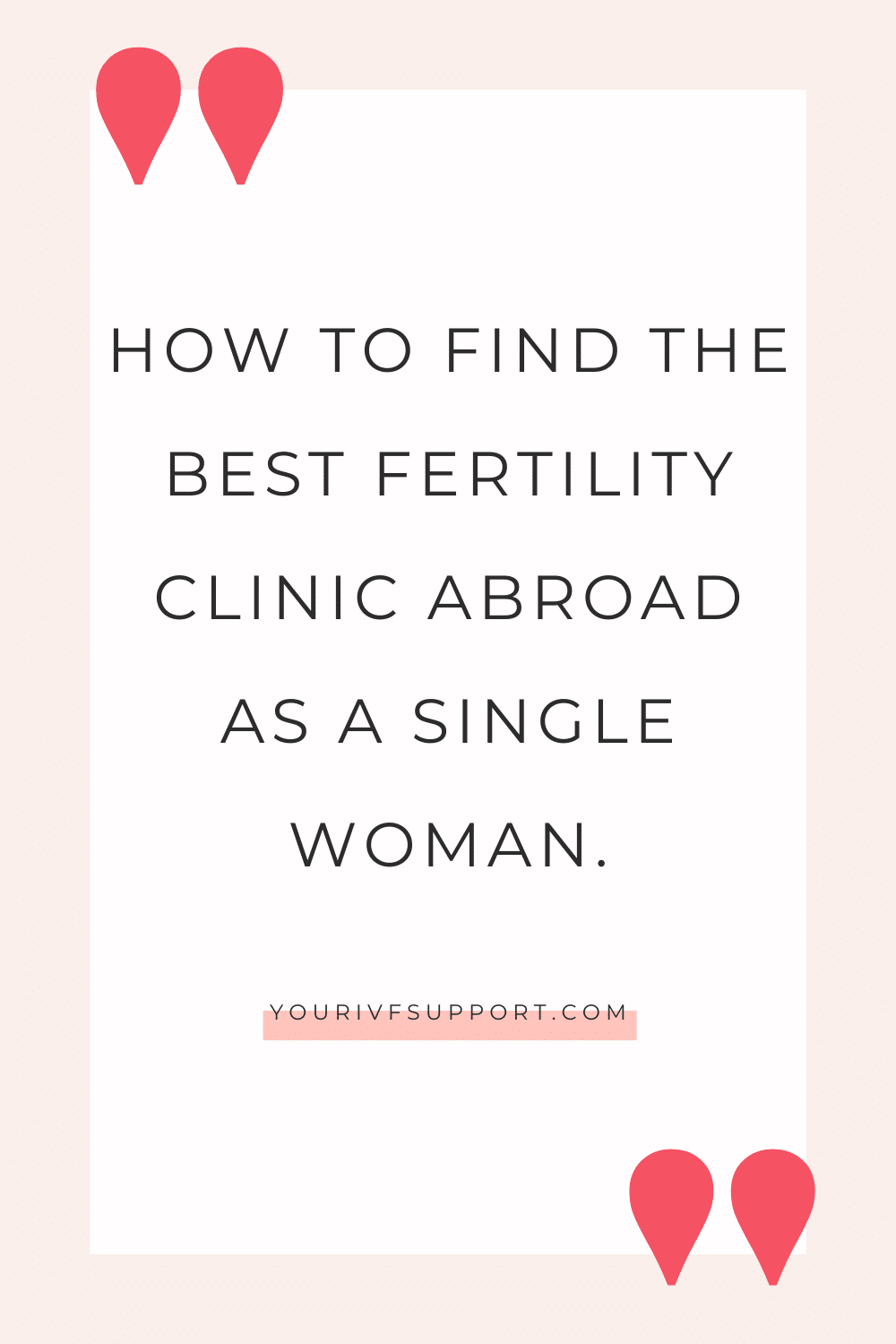
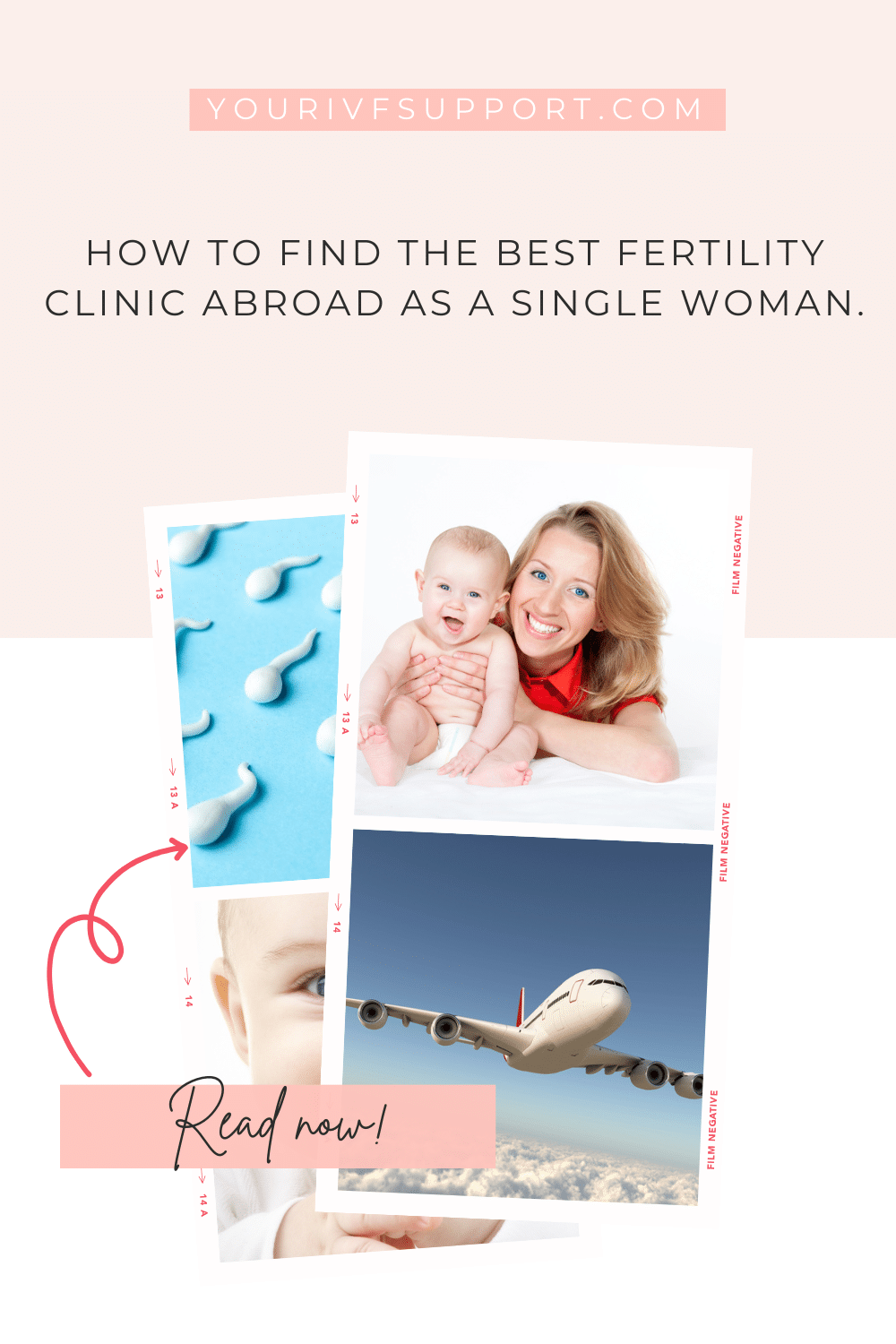
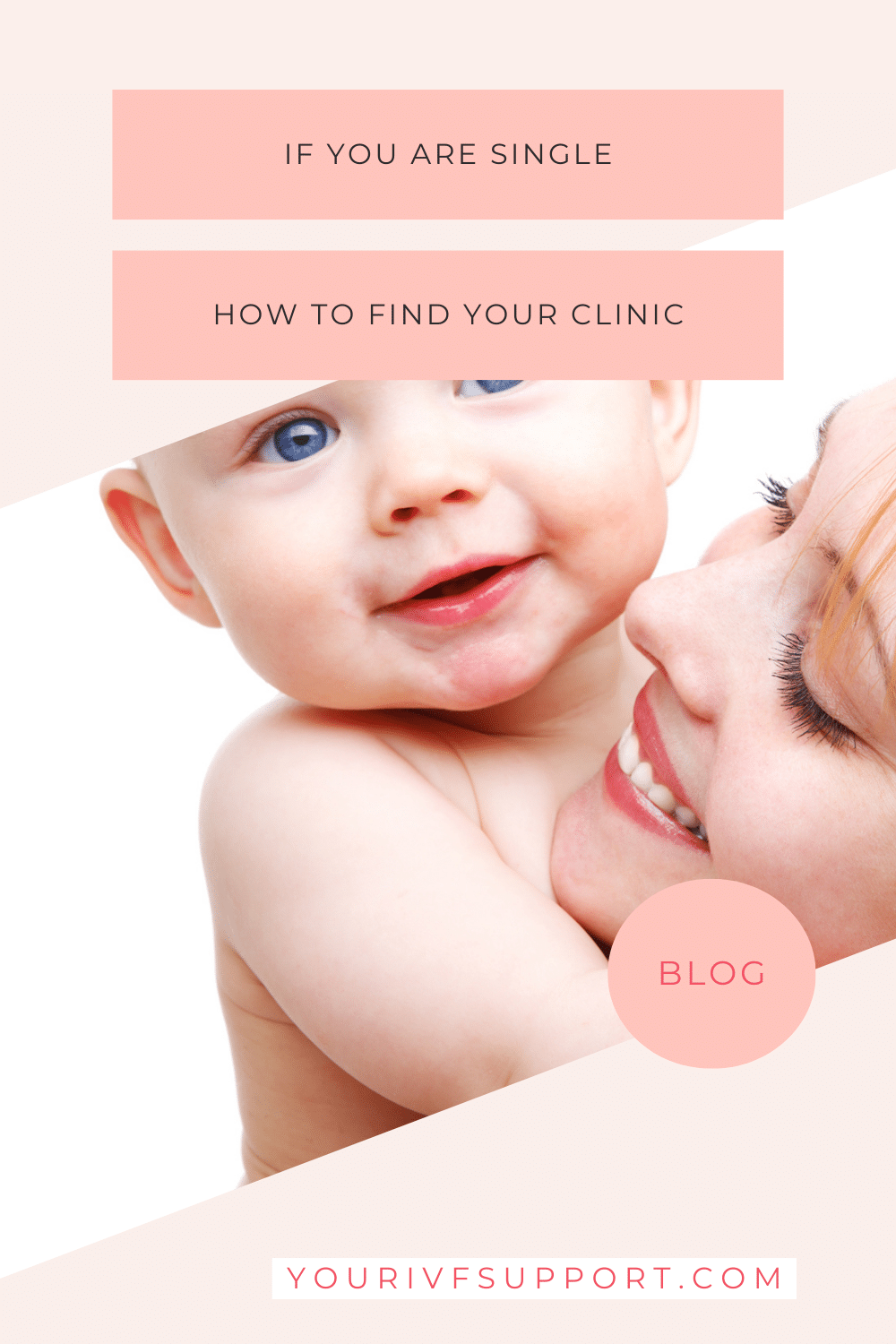
Recommendations for preparing for treatment
IVF treatment can be an exciting but nerve-wracking time for single women trying to have children. Preparing well for treatment can help minimise possible risks and complications, increase the chances of success and reduce stress and anxiety. Here are some recommendations to help you prepare for IVF treatment:
Healthy lifestyle
A healthy lifestyle can help increase the chances of success with IVF treatment. Single women should include a balanced diet, regular exercise and adequate sleep in their daily routine.
Avoid stress
Stress can have a negative effect on the body and the chances of a successful pregnancy. Single women should consider stress management strategies such as yoga, meditation or relaxation techniques.
Build a support network
IVF treatment can be emotionally draining. It is important to build a support network of friends and family to help you through treatment.
Understand the treatment
Single women should read about IVF treatment in advance to understand what to expect. It can also be helpful to ask questions of doctors and medical staff to gain a better understanding of the treatment.
Preparing for possible side effects
IVF treatment can cause side effects such as bloating, headaches or mood swings. Single women should prepare for possible side effects and develop strategies to cope with them.
Financial planning
IVF treatment can be expensive. It is important to plan financially in advance and find out about financing options such as instalments or loans.
Good preparation for IVF treatment can help single women cope better with the treatment and increase the chances of success. By taking these recommendations into account and working with doctors and medical staff, single women can get the best possible treatment and get closer to their dream of becoming pregnant.
The treatment
For single women who want to get pregnant but are having difficulty conceiving naturally, fertility treatment abroad may be an option. IVF treatment can help increase the chances of a successful pregnancy, while the cost of treatment is often lower than in many Western European countries. The following explains the process of infertility treatment for single women abroad to give a better understanding of what women can expect during such treatment.
Procedure for IVF treatment with donor sperm
The process of infertility treatment for single women abroad can vary depending on the country and clinic, but generally the treatment follows a similar procedure. Below are the steps involved in a typical IVF treatment:
Preliminary examination
Before IVF treatment can begin, a woman will need to undergo a preliminary assessment to make sure she is suitable for treatment. This usually includes a gynaecological examination, hormone tests, ultrasound scans and infection tests.
Ovarian stimulation
After the preliminary assessment, ovarian stimulation begins. The woman is given medication to increase egg production. During stimulation, the woman will have regular ultrasound scans and blood tests to monitor the progress of stimulation.
Egg retrieval
Once the ovaries have been stimulated, egg retrieval takes place. This involves removing the eggs from the ovaries and growing them in the laboratory.
Fertilisation
The eggs are fertilised with the donor's sperm in the laboratory. There are several methods of fertilisation, including intracytoplasmic sperm injection (ICSI), where a single sperm is injected directly into the egg.
Embryo transfer
After fertilisation, the embryos are grown in the laboratory until they are ready to be transferred into the woman's womb. Embryo transfer usually takes place 3-5 days after fertilisation. In some cases, more than one embryo may be transferred to increase the chances of a successful pregnancy.
Pregnancy test
About two weeks after the embryo transfer, a pregnancy test is done to see if the woman is pregnant.
If the woman is pregnant, she will usually continue to be monitored by the fertility clinic to ensure a successful pregnancy.
Infertility treatment for single women overseas can be an excellent option to help them fulfil their desire to have a child. However, treatment requires patience, commitment and preparation, as it often involves a long period of time abroad and regular medical check-ups.
Risks and complications
It is important that single women considering fertility treatment are aware of these risks and complications and discuss them with their doctor.
Some of the most common risks and complications of fertility treatment include:
Multiple pregnancies
Some treatments, such as IVF, can result in more than one embryo being transferred into a woman's womb. This increases the risk of multiple pregnancies, such as twins or triplets, which can be associated with higher health risks for both mother and child.
Ectopic pregnancy
An ectopic pregnancy occurs when the fertilised egg implants outside the womb in one of the fallopian tubes. This can happen in women who have had IVF or other treatment.
Miscarriage
A miscarriage occurs when the foetus dies or is expelled from the womb before 20 weeks of pregnancy. Women who have undergone fertility treatment have a higher risk of miscarriage than women who conceive naturally.
Ovarian hyperstimulation
In some treatments, such as IVF, medication can be used to stimulate egg production. In some cases, this can lead to ovarian hyperstimulation, which can cause pain, swelling and other complications.
Infections
Any invasive medical treatment carries a risk of infection. During fertility treatment, infections can occur when germs enter the uterus or the woman's body.
Mental stress
Infertility treatment can be emotionally stressful, leading to anxiety, depression and other psychological problems.
It is important to note that most women who undergo fertility treatment do not experience any serious complications. Most treatments are safe and successful when carried out by experienced health professionals. However, single women considering infertility treatment should be aware that there are risks and should discuss the individual risks and complications of their treatment method with their health care professional.
Chances of a successful pregnancy
Single women who undergo fertility treatment have a good chance of becoming pregnant. The success rate depends on a number of factors, including the woman's age, health and the condition of her reproductive organs.
In general, single women who undergo IVF treatment have higher success rates than women who need treatment for fertility problems. This is because single women tend to be younger and healthier than women who have difficulty conceiving naturally.
IVF success rates vary between countries and clinics. In Spain, Greece and Northern Cyprus, the most popular countries for single women, success rates average around 50-70%. In Denmark, where genetic testing of embryos is not allowed, success rates for older women are lower than in other countries.
However, it is important to note that the success rate of fertility treatment depends on many factors and there is no guarantee of a successful pregnancy. Women undergoing infertility treatment should be prepared for several attempts to become pregnant.
In summary, single women have a good chance of getting pregnant if they undergo infertility treatment. Success rates are usually higher than for women who need treatment for fertility problems. However, women should be aware that there is no guarantee of a successful pregnancy and that fertility treatment often requires several attempts.
Aftercare and support
Infertility treatment does not end with a successful pregnancy. After treatment, comprehensive aftercare and support is crucial for single women. Aftercare includes medical checks to ensure that the pregnancy is progressing normally, as well as psychological support to help women cope with the emotional and physical changes that come with pregnancy. In this article, we will look in more detail at post-treatment support for single women.
Aftercare recommendations
Follow-up care after infertility treatment is crucial for a successful pregnancy and rapid recovery. Here are some recommendations for aftercare that single women should follow after infertility treatment:
Rest and relaxation: After treatment, single women should get plenty of rest and relaxation. It is recommended that they stay in bed for at least 24 hours and avoid physical exertion. It is also important to take time to recover before returning to work or other activities.
Medication: Single women should take their medication as prescribed and follow all instructions given by their healthcare provider. It is also important to keep all follow-up appointments and discuss any questions or concerns with your doctor.
Diet: A healthy and balanced diet is very important during follow-up. Single women should eat a balanced diet and drink plenty of fluids.
Hygiene: Good hygiene is essential after fertility treatment. Single women should maintain good personal hygiene and keep the wound clean and dry.
Support: It can be emotionally difficult to adjust to pregnancy and motherhood after fertility treatment. Single women should seek support from friends, family or professional counsellors to help them cope with the emotional challenges.
By following these aftercare recommendations, single women can increase the likelihood of a successful pregnancy and recover more quickly. However, it is always important that they discuss their individual situation with their healthcare provider and follow their instructions.
Options for psychological support during and after treatment
The decision to start fertility treatment can be an emotional and stressful experience, especially for single women. During and after treatment, there are a number of psychological support options that can help you cope.
One option for psychological support during treatment is to use the counselling services at the fertility clinic. Many clinics offer psychological support from specialist counsellors to help single women manage their emotions during treatment.
Another option is to seek psychotherapeutic support, either in individual or group sessions. Therapy can help manage the psychological effects of treatment, such as anxiety, stress or sadness, and create a supportive environment.
For some single women, talking to other women in a similar situation can also be a helpful support. Online forums or support groups offer the opportunity to share experiences and receive mutual support.
It is important to stress that psychological support during and after fertility treatment is not a weakness, but an important step towards self-care. It can help reduce the emotional stress of treatment and increase the chances of a successful pregnancy.
There are several options for psychological support during and after fertility treatment that can help single women navigate the process and work through their emotions. It is important that single women are aware of their psychological needs and seek the support that is best for them.
Tips for emotional empowerment throughout the process
Infertility treatment can be an exciting, emotional and challenging experience. It is important that single women have adequate support during and after treatment to help them cope with the challenges involved.
One option for psychological support during and after treatment is professional help from a psychologist or therapist. This can help single women to process and manage their thoughts and feelings during treatment. A psychologist or therapist can also help you manage stress and anxiety and maintain a positive attitude.
Another option for psychological support is to join a support group or forum for single women undergoing infertility treatment. Here you can talk to other women in a similar situation, support each other and learn from each other.
It is important to stress that psychological support during and after treatment is not a sign of weakness. Rather, it is an important step in maintaining one's health and well-being and ensuring a positive experience of treatment"[VD2].
There are many ways to get psychological support during and after infertility treatment. Single women should not be afraid to take advantage of these options and accept the help they need to successfully manage this challenge.
Tips if you can't find a doctor to help you.
If you are a single woman seeking fertility treatment, it can be difficult to find a doctor who will support you. You may have already seen a few doctors, but no one seems willing to guide you through the process. This can be frustrating and discouraging, but there are some tips you can try if you are having trouble finding a doctor who will support you.
Firstly, you should contact specialist fertility clinics, as they often have more experience and knowledge of treating single women. A fertility clinic can also recommend doctors in your area who specialise in treating single women[VD3] If you don't have a specialist doctor in your area, you should contact a fertility clinic.
If you cannot find a specialist doctor in your area, you can look for recommendations in online forums and support groups. There are many online communities where women can exchange ideas and get advice. You can also find a local support group where you can meet other women and share experiences.
Another tip is to contact local family planning services or advice centres. They may be able to recommend doctors who support single women and can also give you information and advice about fertility treatments.
It is important to stress that you should not give up if you find it difficult to find a supportive doctor. It may take a while, but with patience and perseverance you will eventually find a doctor who can guide you through the process.
There are many options if you are having difficulty finding a doctor to support you. It may take some research and patience, but in the end you will find a doctor who can help you achieve your fertility dreams.
Conclusion
Für Single-Frauen, die ihren Kinderwunsch erfüllen möchten und dafür ins Ausland reisen, gibt es viele Dinge zu beachten. Vor der Behandlung sollten sie sich gründlich über die Kinderwunschklinik informieren und sicherstellen, dass sie die benötigten Dokumente und Voruntersuchungen haben. Es ist auch wichtig, sich auf die Behandlung vorzubereiten und nach der Behandlung die empfohlene Nachsorge zu beachten.
Es gibt verschiedene Behandlungsmöglichkeiten wie Samenspende, Doppelspende und Insemination. Die Erfolgsraten können je nach Land und Klinik unterschiedlich sein, aber im Durchschnitt liegen sie bei etwa 50-70 %. Die meisten Länder bieten sowohl offene als auch anonyme Spenden an.
Während der Behandlung können psychologische Unterstützung und Beratung sehr hilfreich sein, um mit den emotionalen Herausforderungen umzugehen. Es ist wichtig, Unterstützung von Freunden, Familie oder professionellen Beratern zu suchen.
Letztendlich sollten Single-Frauen ermutigt werden, ihren Kinderwunsch zu verfolgen und sich nicht entmutigen zu lassen. Obwohl es Herausforderungen geben kann, ist es wichtig, positiv zu bleiben und auf das Ziel hinzuarbeiten, eine Familie zu gründen.
